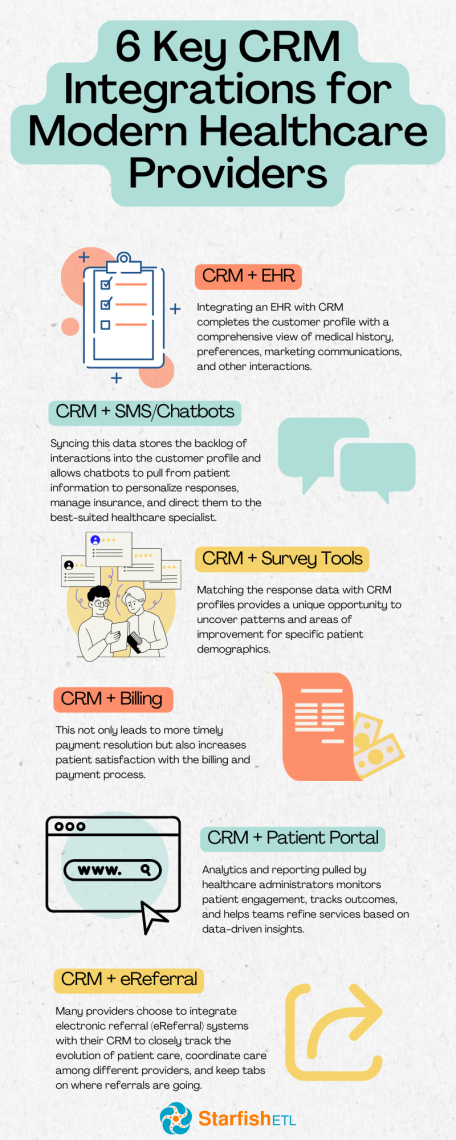Enhancing Patient Care: 6 Key CRM Integrations for Modern Healthcare Providers


In the U.S., healthcare CRM is estimated to grow at a compound annual growth rate (GAGR) of 8.4% each year through 2030. Laboratories, medical institutions, clinics, and hospitals use CRM software to manage patient data, telehealth appointments, follow-up care, referrals, and much more.
As the healthcare market caters to evolving patient demands, integrating CRM with other applications becomes essential. Integrated platforms support healthcare operations by improving the patient experience, facilitating faster payment turnarounds, increasing coding accuracy, simplifying referrals and follow-ups, and aggregating patient data across locations. Here are the top CRM integrations healthcare providers are prioritizing to build on these efficiencies.

Electronic Health Record (EHR) systems make it easy for doctors and nurses to compile and navigate patient data. Integrating an EHR with Customer Relationship Management (CRM) completes the customer profile with a comprehensive view of medical history, preferences, marketing communications, and other interactions. These insights inform more personalized and complete care while optimizing appointment scheduling.
EHR and CRM integration also supports more streamlined administrative processes, allowing healthcare facilities to manage records and data entry from a single access point. This saves time for administrative teams and reduces unnecessary documentation errors.
Healthcare providers know a patient’s experience starts well before they walk into the facility. Modern providers exceed customer expectations by offering digital services beyond the standard appointment scheduling portal.
This comes in the form of SMS appointment reminders and follow-up messages. In many cases, healthcare providers also tap into chatbots to answer patient queries when healthcare staff are unavailable, or the patient is asking a common question.
Syncing this data not only stores the backlog of interactions into the patient profile, but also allows chatbots to pull from patient information to personalize responses, manage insurance, and direct them to the best-suited healthcare specialist.
What do healthcare providers do with the patient feedback they acquire? Matching the response data with CRM profiles provides a unique opportunity to uncover patterns and areas of improvement for specific patient demographics. For instance, if patients of color are reporting higher rates of dissatisfaction, it’s an opportunity for the healthcare provider to turn a focus to equity initiatives. The CRM data enhances survey feedback analysis to pinpoint deeper analytical data that providers can learn from.
Connecting the CRM with the healthcare facility’s billing solution has a few key benefits: it streamlines payment processing, expedites insurance claims, and simplifies financial interactions with patients. This not only leads to more timely payment resolution but also increases patient satisfaction with the billing and payment process.
Healthcare providers commonly provide portals because they’re a secure way for patients to access health records, test results, and treatment plans. When the CRM is integrated with the portal, patients are empowered to make informed decisions and gain a better understanding of the plans and treatments available to them.
Analytics and reporting pulled by healthcare administrators monitors patient engagement, tracks outcomes, and helps teams refine services based on data-driven insights. Workflows can be adjusted automatically through the CRM integration triggers, freeing up staff to focus their attention on patient care.
When healthcare providers refer patients for specialized care and treatments, it’s helpful to have a way to track that journey. Many providers choose to integrate electronic referral (eReferral) systems with their CRM to closely track the evolution of patient care, coordinate care among different providers, and keep tabs on where referrals are going.
Data security for any integration is always crucial, but it’s especially important in an industry where strict regulations like HIPAA dictate how sensitive patient information can be used. Providers must pay close attention to how data is shared between systems, who has access, and how long information is retained. Integrations can be automated to help monitor for compliance, but it’s important for the provider to understand their role as well.
Fill out the form below and we will contact you